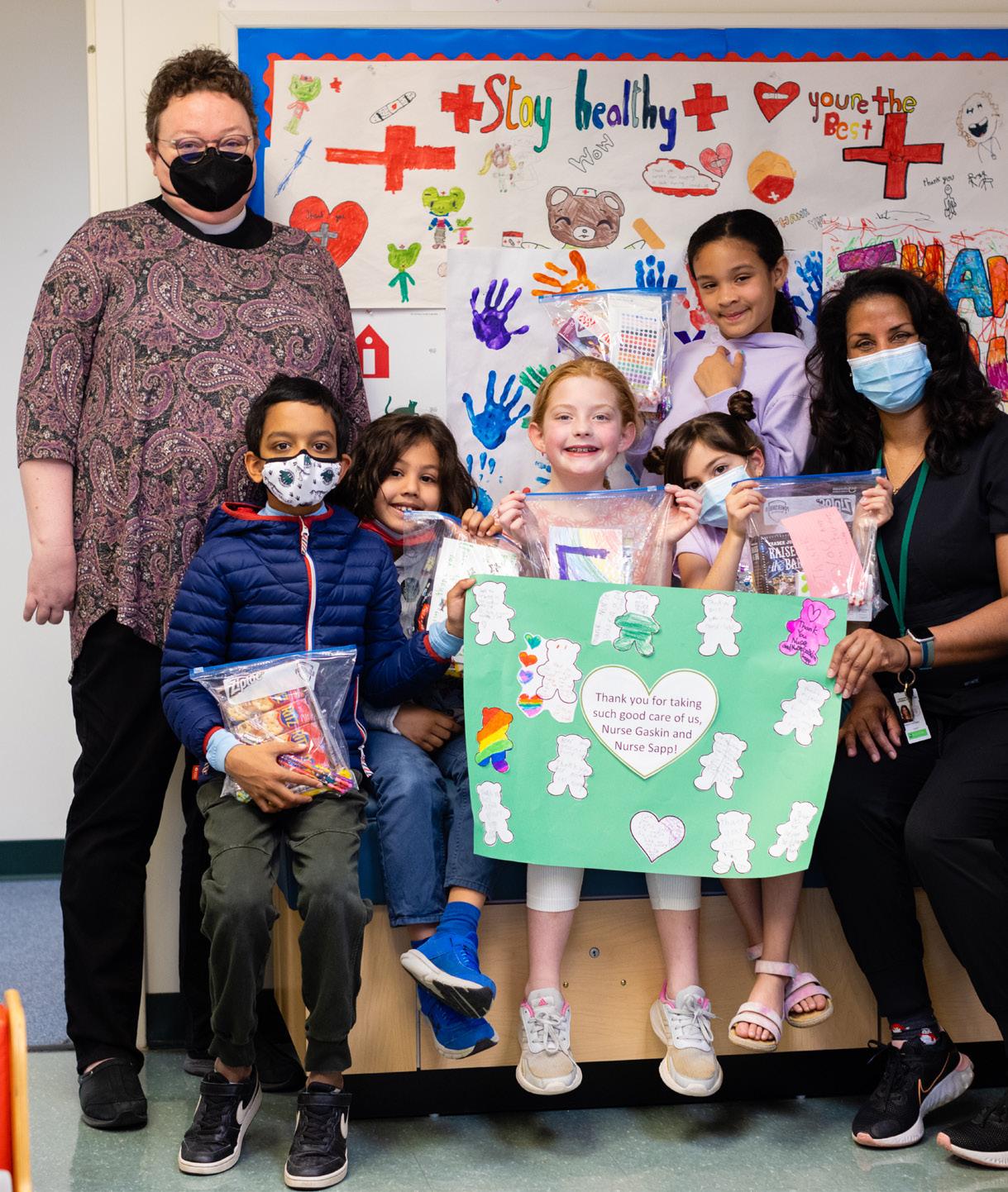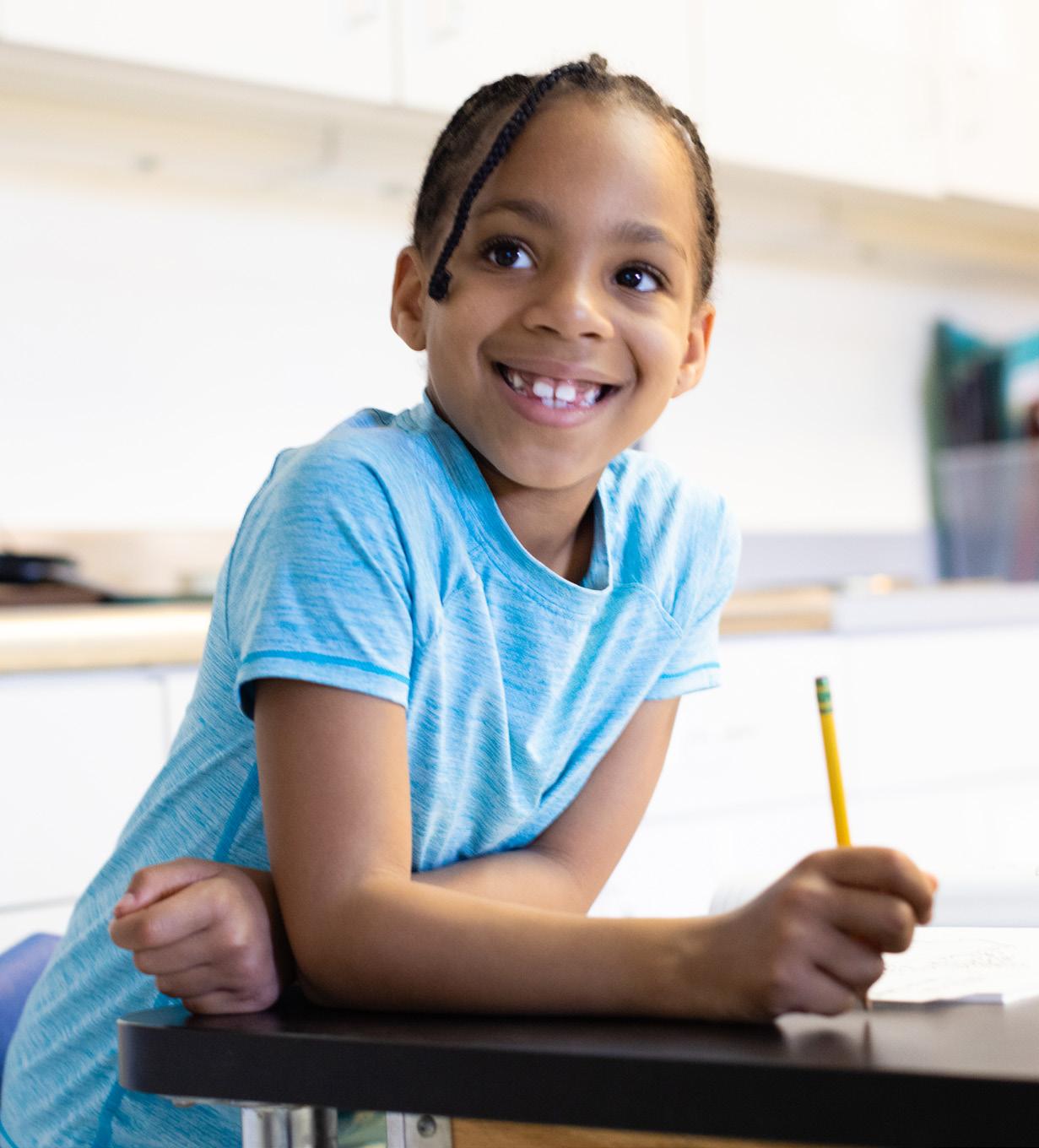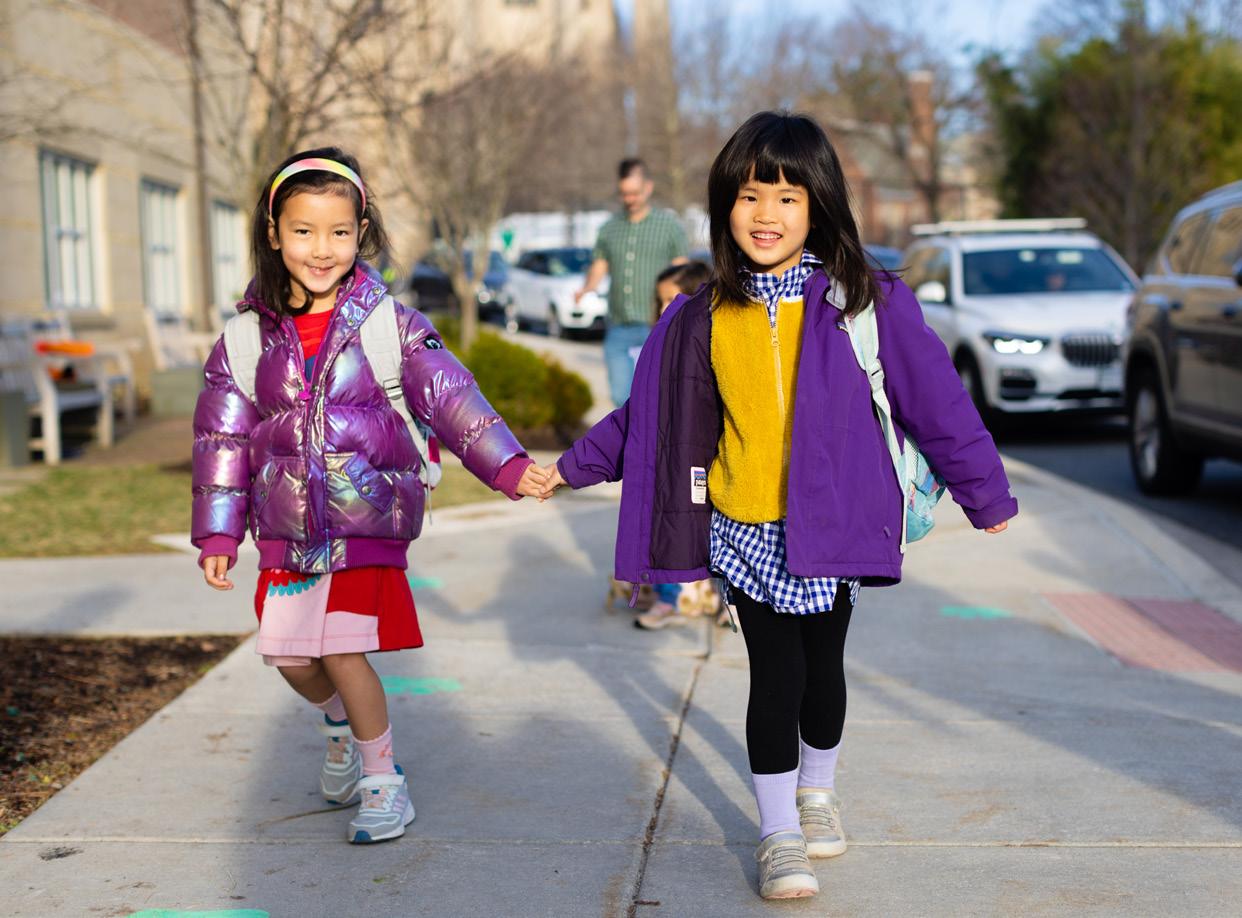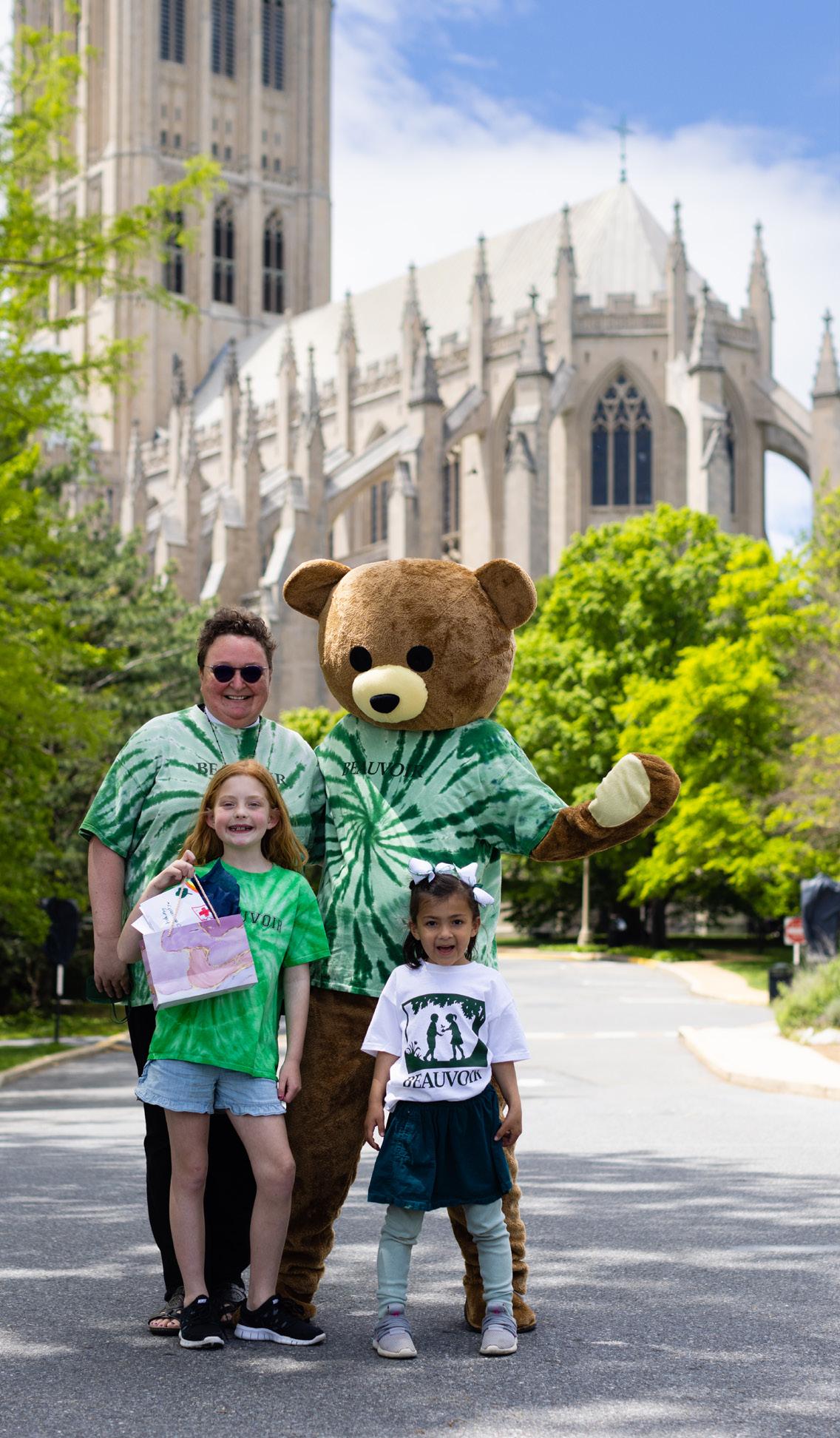
6 minute read
Helping Hands Service Learning Shines at Beauvoir
from Views Fall 2022
One day, The Rev. Dr. Lisa Barrowclough, Beauvoir Chaplain, hopes that she won’t lead her weekly Thankful Thursday lessons in classrooms across the School. She dreams of stepping back from the podium not because she wants to abdicate responsibility but because she wants to see Thankful Thursdays steered by Beauvoir’s very own students.
“The goal is, increasingly, for students and classrooms to take on the leadership of this initiative and be the real inspiration,” said Rev. Barrowclough. “I would love to not be the only voice in a Thankful Thursday video, but rather have students stand up and teach the rest of the school.”
Rev. Barrowclough’s Thankful Thursday lessons, which began as videos streamed into homes, then classes, during the COVID-19 pandemic, have become a weekly fixture at Beauvoir and represent one of the School’s core approaches: developmentally appropriate, childcentered service learning that engages students and encourages them to take the helm.
In alignment with Beauvoir’s Life Rules— Kindness, Respect, Responsibility, and Honesty—students are introduced to service learning in pre-kindergarten, and follow an evolving curriculum through third grade. Service learning provides opportunities for students to build relationships with their community, make connections between their school and the outside world, and engage in direct action alongside theory learning in the classroom. Research indicates students who participate in service learning are more engaged in their community, more likely to attend college, and better equipped with vital problem-solving skills that they carry with them for years to come.
One hallmark of Episcopal education is the belief that children can and should contribute meaningfully to their community, and Rev. Barrowclough believes there is no better time to start than the earliest years of learning.
“Episcopal education values each individual as a whole person,” she said.
“Beauvoir is the ideal spot to live out that component of Episcopal identity that says everybody is a child of God, and they will be honored and respected and celebrated for everything that’s in them, whoever they are, and whoever they will be.”
In past years, service learning has taken the form of second grade students playing bingo games with senior citizens at St. Alban's, an annual walk-a-thon to benefit a local nonprofit, and Thanksgiving pies in hand-decorated boxes for neighbors in need. When COVID-19 arrived, however, many of Beauvoir’s previous service-learning programs needed to be adapted quickly to meet the demands of a pandemic world.
Rather than view the situation as a crisis for the service-learning program, Rev. Barrowclough saw an opportunity. “At best, service is relational,” she said. “Six months into my first year, relational wasn’t an option. We were home learning. It was a new journey.”
As students learned virtually and positive case numbers rose, Rev. Barrowclough and other Beauvoir educators were inspired by the words of Fred Rogers on his classic PBS program Mr. Rogers’ Neighborhood: “When I was a boy and I would see scary things in the news, my mother would say to me, ‘Look for the helpers. You will always find people who are helping.’”
Rev. Barrowclough noted, “We know from research that gratitude is a really important practice. We know that practices become habits if you want them to be lifelong and meaningful and as enriching as possible. If you want habits and practices to become passions and legacies, then you start them in early childhood.” Rev. Barrowclough said, “You wash your hands, you brush your teeth, you reach out to others, you give thanks.” Thus, Thankful Thursdays were born.
Every week, Rev. Barrowclough recorded and posted a new video for students Pre-K through third grade focusing on a different aspect of gratitude. Students received gratitude journals to document their experiences as they “exercised their attitudes of gratitude.” They learned about what gratitude looks like across different faith practices and cultures. They discussed people and privileges they were thankful for in their own lives. They found the helpers in their own communities, and they discovered ways to show their thanks for them.
This meant thanking doctors, nurses, and other essential workers as the pandemic raged around the world. Families received worksheets for Thanksgiving “Chow Chats,” which included questions to start a conversation about gratitude at the table. After the January 6, 2021 events at the Capitol left the building in need of cleaning and repair, students participated in a nationwide effort to write thank you cards to employees who were working hard to restore the building. Further, classrooms reflected on their gratitude for important figures in history whose dreams made life today possible. In one Thankful Thursday lesson, students discussed the legacy of the Rev. Dr. Martin Luther King Jr., and in another, they considered all of the hard workers who make our traditions of democracy possible.

As students practiced gratitude in the classroom and onscreen, Rev. Barrowclough began to notice a gradual change in their approach to service learning. Children were identifying needs in the community on their own, and looking for ways to solve those problems together.

“The ultimate goal of this service learning for me and other grownups is to be able to take a backseat to the children in driving this initiative,” Rev. Barrowclough said.
“Children will be most passionate and most committed, and the effort most meaningful if our projects are inspired by them.”
In the spring of 2021, students in the Arctic Foxes kindergarten class had been paying close attention to how the ongoing pandemic was affecting those around them. One student pointed out that as people lost their jobs, they might struggle to purchase groceries. They wondered how Beauvoir could help and, ultimately, came up with a plan: a food drive for neighbors in need. The Arctic Foxes pitched the idea to their teacher, and joined Rev. Barrowclough to share the project with the School in a special Thankful Thursday video in May.
“Sometimes people have little or no money to buy food because the businesses they worked for closed. This is what happened to many people in America when we had to quarantine because of the coronavirus,” Arctic Fox student Liam said.
“Things are getting better all the time because people are doing things to make a difference, and they still are today,” said Lila, another Arctic Fox.
William, another classmate, finished their message with a call to action: “Join us in collecting canned food, nonperishable items, or gift cards to donate to feed hungry families!”
Beauvoir partnered with the Washington National Cathedral and United Planning Organization (UPO), which fights poverty in DC and across the country, and collected more than 20 big boxes of food for neighbors in need. Donations came from students across all grade levels, and were distributed to families throughout the region.
This was a sign of success to Rev. Barrowclough. Students were stepping up to guide what service learning looked like at Beauvoir. “So often children inspire us and bring us back to what is most basic and most important in our crazy adult world where we could lose sight of some of the needs,” she said. “It’s important in any household or any family, where there’s so much going on, for the child to be the voice that says, ‘People are hungry in our neighborhood.’”

DREW MACKAY, DIRECTOR OF AUXILIARY PROGRAMS
To offer children more agency in the service-learning process and encourage child-driven engagement, Rev. Barrowclough works with students to write notes to their grownups about their own hopes and dreams for service projects. When refugees arrived from Afghanistan in the fall of 2021, Beauvoir students wrote welcome notes and sent children teddy bears to welcome them to the United States. In addition, students went home with notes in their backpacks detailing their hopes for a drive to support refugees with basic needs as they settled into their new homes in winter. Children presented their families with ideas about what items were most important to donate and brought in bags and boxes of warm clothing for their new neighbors.
Led by students, service learning at Beauvoir has also expanded far beyond Thankful Thursdays. Students in Beauvoir’s Bear Den after-school enrichment program have stepped forward to help their community. When students noticed that the lost-and-found area at school was overflowing, they volunteered to take over managing the collection to make items easier to find.
“Their ritual every Friday afternoon is to go out to the playground, pick up all the items that have been left for the week, and then come in and organize the storage closet,” said Drew Mackay, Director of Auxiliary Programs. “Kids’ capacity to understand the world around them grows every year as they get older. It builds that foundation of looking out for not only yourself but also your friend and your neighbors.”
Beauvoir recognizes that every child has unique talents that they bring with them. “Some models of learning and development see the child as on the way to being a contributor to the betterment of the world,” said Rev. Barrowclough. “We believe at Beauvoir and in Episcopal education that they’re already making a valid contribution to making this world a better place, and it is our honor and our delight to be able to be a part of that.”
Rev. Barrowclough is not quite ready for students to take over Thankful Thursdays yet. She still has many more gratitude challenges, outreach collections, care packages, and thank you cards to organize, but the evidence is clear: at Beauvoir, students are on their way to becoming leaders in service and beyond. ✿










